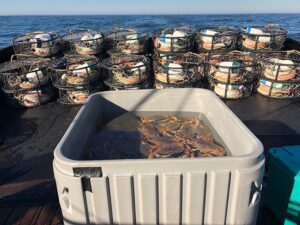
Bad news for crab fishermen in Oregon was delivered on Aug. 4. On that date, the state’s Fish and Wildlife Commission voted to extend, with no sunset date, restrictive crabbing measures that were originally supposed to expire after the current season.
The rules restrict the number of crab traps in the water and how deep the traps can drop in the late-season months when humpback whales are more likely to swim there.
The restrictions were first put into place due to the fact that humpbacks migrate off Oregon’s coast and they, along with other types of whales, can get caught in the vertical ropes connected to the heavy traps and drag them around for an extended period of time, in the process becoming injured, starved and exhausted, leaving them susceptible to drowning.
The ODFW initially issued a fleet advisory for commercial Dungeness crab harvesters in May, urging vigilance to avoid setting gear in area where humpback whales are transiting or foraging to further minimize risk of entanglement.
Due to ocean dynamics and the rapid movement of whales, the locations of whales can change over time, and ODFW has expressed concern about avoiding entanglements with fishing gear.
Whale entanglements started to increase in 2014 along the West Coast but remained low and stable in Oregon. Humpback whales, a federally-listed species with a growing population off the West coast, are the whales most frequently entangled.
They can get caught in the vertical ropes connected to the heavy traps and drag them around for months, leaving the mammals injured, starved or so exhausted that they could drown.
The restrictions placed by the ODFW have led to backlash, as crabbers have said they think that overregulation can harm the industry.
Although there’s no sunset date for the restrictions, ODFW commissioners requested that they be reviewed after two years.
In the meantime, crabbers are being reminded to remove any fishing gear not actively being tended and to promptly remove all gear from the ocean when finished crabbing for the season.
ODFW officials have said crabbers should adjust the length of pot lines when moving pots to shallower water to maintain taut vertical lines, minimize surface gear and ensure no excess line is floating at the surface.
They should also, according to the Fish & Wildlife, avoid setting gear in the vicinity of large feeding aggregations of whales, and are urged to participate in derelict gear recovery by getting a permit to recover gear or report locations of derelict gear for permitted vessels to target for removal.
Managing Editor Mark Nero can be reached at mark@maritimepublishing.com.
